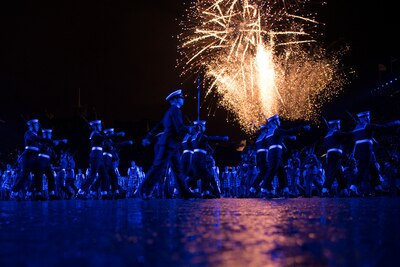ABOARD A MILITARY AIRCRAFT, Aug. 26, 2017 — Marine Corps
Gen. Joe Dunford used his invite to the Royal Edinburgh Military Tattoo in
Scotland to visit British bases in the area and speak with senior United
Kingdom defense leaders on a wide range of defense topics.
The chairman of the Joint Chiefs of Staff was invited months
ago by his U.K. counterpart, British Chief of Defense Staff Air Chief Marshal
Stuart Peach, to visit the tattoo and take the salute from the British units
participating in the event.
“I didn’t realize how big the tattoo was when I accepted,”
Dunford said during an interview on a flight back to Washington. “I learned.”
The tattoo ceremony is held at the esplanade of Edinburgh
Castle the month of August, and more than 210,000 attend the event with about
100 million viewing the event on TV, according to news reports.
Earlier in the day, Dunford met with British Defense
Secretary Michael Fallon and Peach to discuss a full range of issues from the
South Asia strategy to the situation in East Asia – specifically North Korea's
nuclear and missile programs.
“Both from my trip and the [positive] rhetoric that is
coming out of Beijing is that the economic and political pressure is having an
effect,” Dunford said. “It remains to be seen if the campaign will be
successful, but there are indications that things are heading in the right
direction.”
Chinese officials told North Korean leader Kim Jong Un that
if he launched a missile toward Guam, he was on his own. China surprised the
world by voting for sanctions against North Korea in the U.N. Security Council
and now appears to be enforcing those sanctions, Dunford said.
Still, it is “much too early,” he said. “You can’t measure
enforcement sanctions in weeks, but again the rhetoric has been positive from
Beijing.”
Dunford also discussed opportunities for continued
military-to-military engagement between the United States and the U.K. “We
obviously have a very strong relationship with the U.K., and they are with us
in Iraq and Afghanistan,” Dunford said.
The chairman visited the future HMS Prince of Wales – a
Royal Navy aircraft carrier being built in Rosyth, Scotland. The British ship
will field American-built F-35B Lightning II aircraft.
“Any future fight is going to require a coalition, and
interoperability is a critical and fundamental element of alliance and
coalition warfare,” Dunford said. “This reflects the close nature of the
alliance and bodes well for the interoperability.”
The chairman received positive feedback from the British
leaders on the new strategy for South Asia announced earlier this week.
“It is fair to say that all of the nations that are
currently contributing to the Resolute Support Mission, and certainly all of the
nations who have been there since the very beginning like the U.K., … have
received the strategy well,” Dunford said.
Coalition allies tell Dunford they believe the
conditions-based approach is the right approach, “and that it will allow us all
to have a longer-term horizon to assure our Afghan partners of our continuing
support,” he said.
The strategy helps Afghan President Ashraf Ghani with his
four-year plan to deal with corruption issues and economic development.
“Instead of a one-year-at-a-time campaign, we can start to take a longer term
approach and have confidence that the resources necessary to implement this
longer term approach will be there,” the chairman said.
In addition to the British allies, Dunford spoke with other
NATO allies, the Chairman of the NATO Military Committee, Czech Gen. Petr Pavel
and other close partners. He noted that Army Gen. Curtis M. Scaparrotti,
Eucom's commander and NATO Supreme Allied Commander Europe, has also spoken to
allies, as has Army Gen. Joe Votel, the U.S. Central Command chief.
“We’ve touched a lot of people this week and there has been
universal support for the approach we are taking,” the chairman said.









